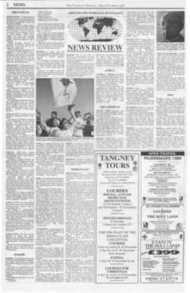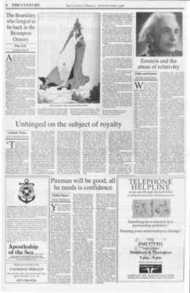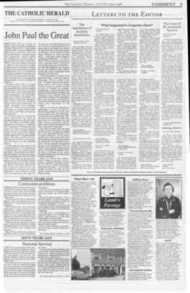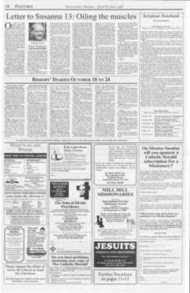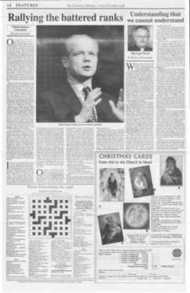Page 5, 16th October 1998
Page 5

Report an error
Noticed an error on this page?If you've noticed an error in this article please click here to report it.
Tags
Share
Related articles
Queen Leads Tributes To Pope
John Paul Ii Musical Tours Spain
Home From Home For Disabled Heroes
A Pilgrim's Progress In A World That Had Forgotten Its Story
Ope Of The Space-age
A pope-obsess. of God and the dignity of mankind
John Paul II was elected 20 years ago. Charles Moore
went in search of the pope who changed history
IN 1959, Michael Irwin, now a professor at the University of Kent and then a young graduate from Oxford, found himself spending Christmas with a Polish family at the University of Kracow. On Christmas Eve the family entertained a clerical guest. Irwin wrote home to his mother and described him thus: "Mass was said by a most impressive man . . . He's the new Bishop of Krakow, and at 38 may be the youngest RC bishop in the world.
"He's shone in the past as scholar, actor and athlete. He's also been an immensely enterprising parish priest and a fulltime worker in a soda factory . . . as a result of all this, he's immensely popular here, and everyone has great hopes of him. He's a striking-looking man and completely kind and unassuming. He played happily with the children."
To his girlfriend Irwin wrote and said: "I think this man will be the next Pope."
In fact, two more Popes intervened, but on October 16, 1978 this prophecy (by someone who knew nothing about the ways of Rome) came true. Karol Wojtyla was elected Pope and chose the title John Paul II in deference to his immediate predecessor who had survived in the office only a month. John Paul was the first non-Italian Pope for 450 years. His election was, and remains, one of the most extraordinary events of the 20th century.
In May of this year, John Paul became the longest-reigning Pope of the century. This week, the Church celebrates the twentieth anniversary of his election as supreme pontiff. What has happened to him? There has been a heavy physical toll. Karol Wojtyla was 58 when he was elected, the youngest Pope in modern times, and strong and fit. He skied and swam, and needed his exercise. When taxed a few years later about the cost of the swimming pool installed in his summer residence of Caste! Gandolfo, he replied "It's cheaper than another conclave."
Since his election the Pope has been gravely wounded by a would-be assassin's bullet in 1981, and undergone subsequent colon and hip operations. He now has Parkinson's disease. His left hand shakes and his voice slurs slightly. The stoop that he has had since his youth is now pronounced.
When I attended a general audience in St Peter's Square at the end of last month, I had not seen the Pope in the flesh since his visit to Britain in 1982. As he moved round the square in the 'Popemobile', waved to the crowds and then ascended the dais I was, at first, shocked by his appearance. One Vatican official told me that he hates being old and shakes the stick he often has to carry and exclaims "Old age!". But as the two hours continued, he gathered strength, and when I was presented to him immediately after the audience his eye was bright and humorous, and the frozen facial appearance that Parkinson's brings had relaxed to reveal the continuing power beneath.
The Pope's demeanour always reminds me of the Biblical text on the Golden Syrup tin: "Out of the strong came forth sweetness".
Despite John Paul's afflictions, his work continues unabated. He is up at 5.30am, goes to his chapel to pray alone at 6arn, says Mass at 7am, then entertains guests to a working breakfast, and works right on through the day six-and-a-half days a week. Every Sunday, when he is not saying a public Mass in St Peter's, he visits one of his local parishes in his capacity as Bishop of Rome. He continues to travel the world. He reads voraciously. Even his short holidays are arduous. This summer he walked in the Dolomites wearing the old Polish boots that are almost his only possessions and supporting himself with the
ski sticks that he can no longer use for their original purpose.
His mental capacities seem undiminished. The words continue to flow. His latest encyclical, Fides et Ratio (Faith and Reason), is expected to be published on the day before his 20th anniversary. There is provision for a Pope to retire, but no one believes that he will.
There can seldom have been a Pope to have won better character references.
According to the American Cardinal Edmund Szoka, the head of the government of the Vatican City, John Paul is "the most prayerful person I've experienced". This allows him "to go from one problem to another with tranquillity" — he follows St Augustine's instruction to "work as if everything depended on you and pray as if everything depended on God".
Another Vatican official who finds the Italians of the curia maddening says that "the Pope is about the only one here with his feet on the ground".
His cheerfulness and good temper are virtually unfailing. His able press secretary. Joaquin Navarro-Valls, says that only violence provokes anger in the Pope. He recalls, for instance, that he could barely maintain his self-control in the presence of the President of Sudan, whose government is persecuting Christians and animists in the south of his country. Even to a British commentator who is one of his very fiercest critics within the Catholic Church, John Paul is "almost certainly a saint".
One very senior prelate told me that he had known Mother Teresa and admired her, but found that the Pope's holiness made a far deeper impression on him even than hers.
And then there are people everywhere — the crowds, sometimes exceeding a million strong, who come to see and hear him, and the thousands of those, such as Michael Irwin, who personally came across him before or during his papacy and found the experience unforgettable. In his book Crossing the Threshold of Hope, John Paul writes that "as a young priest I learned to love human love". All over the world, people seem to believe this, and to love him back.
Years ago, a sleazy old Roman journalist said to me: This Pope — good-looking bloke and all that. He must have slept with a girl, mustn't he?" Biographers assure us that the answer to the question is "no", but the remark strikes me as a sort of compliment. This Pope is in no sense worldly but he is a man for whom the world, human flesh and blood, is utterly real.
Unlike many products of the Vatican, he is a man before he is a priest.
MIKHAIL GORBACHEV, the then Soviet leader, visited the Pope in the Vatican in December 1989. He was responding to a private letter and attached memorandum from John Paul that had been delivered to him in October of the previous year.
Gorbachev brought his wife and introduced her thus: "Raisa, I should like to introduce His Holiness, who is the highest moral authority on earth, but he's also a Slay." For Gorbachev, the "but" expressed a friendly complicity.
For John Paul's critics, the Slav is the problem. They say his Polishness makes him conservative and authoritarian. Either way, Gorbachev's remark seems to be the neatest encapsulation of John Paul's impact upon the world.
There can be little doubt that the election of Karol Wojtyla and his subsequent actions fatally undermined the Soviet empire. This was not because of power politics; these were successfully employed by Ronald Reagan and Margaret Thatcher. Rather, it was by moral force arising from the authenticity of personal experience.
A man brought up as close to Auschwitz as my office is to Tunbridge Wells, a man who trained to be a priest when the Nazis made it illegal, a man who ministered to his people for 30 years under the glare of atheistic Communism, such a man had a right to speak, and he knew what to say.
He said, in his famous sermon on his inauguration as Pope, "Be not afraid!", and, in his visit to Poland the following June, his reception from millions of his fellow countrymen rendered the Communists impotent.
His constant use of the word "solidarity" and his development of the social theory it implied gave world attention and approval to Lech Walesa's trade union of that name. True, the Polish Communists imposed martial law in 1981, but they could only slow, not prevent, a movement of a people unafraid.
Eventually, even in Moscow, the movement was reluctantly accepted. When Gorbachev returned to the Vatican to pay a friendly call last year, he said to NavarroValls: "That letter (of 1988) was the beginning of everything." (It is interesting to discover that the Pope sent a comparable letter to the late Deng Xiaoping and never had a reply.) Not only did John Paul make everyone see that Communism was morally and politically unsustainable, he also prescribed the peaceful means of its collapse. This attention to means as well as ends is important to him (it is an important part of Catholic moral teaching).
It is visible in Latin America, too, where the Pope repudiated the Mandan analysis and legitimation of violence that lay behind Liberation Theology and yet successfully worked on several odious regimes to respect human rights.
It is visible, too, in his current work with Cuba. John Paul wants the end of Communism there, of course, and the establishment of religious freedom, but he has convinced Fidel Castro that he is working in the interests of peace and not in those of America. Good faith is the key.
On the plane to Cuba last January, the leading Vaticanologist Marco Politi wanted to know what the Pope would say to Castro. "I shall ask him what his truth is," was the reply. It is hard for any leader not to want to rise to such a question, from such a source.
JOHN PAUL'S critics within the Catholic Church — and they are fierce, though not as numerous as might appear from a reading of the Western press — accept most of this. They admire the Pope as a man and respect his achievement in relation to Communism. But they use this as a means of lamentation. How sad it is, they say, that one so genuinely concerned for human freedom in the political sphere can be so dictatorial when it comes to his own Church.
What has happened, they ask, to the "collegiality" promised by the Second Vatican Council: the common government of the Church by its bishops rather than just by its head? And how can a man so full of human sympathy be so blind to so many human yearnings? They cite the disciplining of various theologians —Hans Kung, Leonardo Boff and, more recently, the Sri Lankan Tissa Balasuriya — and blame the Pope for giving so much control to Cardinal Joseph Ratzinger, the head of the Congregation for the Doctrine of the Faith. They complain that the reiterated rejection of contraception, women priests, divorce, married clergy and homosexual acts is forcing good Catholics into disobedience and desertion. They speak of a "rule of fear".
Wondering how best to consider this question, I draw up a list of the Pope's attitudes under two headings — "liberal" and "conservative". The "liberal" list, which is about a third longer than the "conservative", includes his opposition to capital punishment, global capitalism, fundamentalism and arms manufacture, as well as his support for trade unions, human rights. international organisations, the spirit of Vatican II (some of whose documents he drafted), dialogue with other faiths, his apology for Catholic antiSemitism, and his rehabilitation of thinkers, such as Galileo, once condemned by the Church.
In the "conservative" column stand his opposition to sexual freedom, to euthanasia and to abortion, his readiness to reassert discipline over priests in what they wear, whether they marry and what they teach, and his devotion to the Virgin Mary.
Merely to make this list is to see that, in relation to John Paul, the words "liberal" and "conservative" are, as one Cardinal in Rome put it to me, "categories of archaeology". It is not that the Pope is in some respects the one, and in some respects the other. It is
rather that he is something else.
Seeking what that something else might be. I visited Cardinal Ratzinger, the bugbear of the Pope's critics, the German "Panzer Cardinal", who is the Vatican's chief intellectual. He first heard of Wojtyla's writings in 1964, first met the man at the Conclave in 1978 and has served him in the Vatican since 1982. Most Friday evenings for the past 15 years, the two men have met informally and talked about theology.
John Paul's style of discussion, says Ratzinger, is "provocative". He approaches intellectual matters as a philosopher, not as a theolo gian. Ratzinger describes him as a "real philosopher — touched in the heart by the fundamental questions of what is our life". He is the fast Pope to be a philosopher and his philosophy is not specifically Catholic, or even specifically Christian. His academic work was on phenomenology — the theory of the innate significance of every human experience.
The Christianity arrives. for John Paul, as the only satisfying explanation of the question the philosopher asks: "What is man?" It answers his obsessive search for human dignity, a search that brings him back again and again to the story of the Creation and the Fall in Genesis and, thence, to the Redemption through Christ, the second Adam.
John Paul says that his very first encyclical Redemptor Hominis "aims to be a great hymn of joy for the fact that man has been redeemed through Christ — redeemed in spirit and in body". For him, this fact dictates what every human being should do. It also dictates what a Pope should do.
A Pope should oppose everything which, in John Paul's words. is to do with "having" rather than "being". This means that Marxism's materialist obsession with ownership of the means of production is wrong. It means that global capitalism's view of human beings as instruments of production is wrong. The abortionist regards the foetus as an aggressor or an inconvenience when. in fact, it is human and innocent: that is wrong.
What is right is what the Pope calls "the affirmation of the person as a person". Throughout the life of the world, he seeks out such affirmation and exalts it: "Perhaps more than men, women acknowledge the person, because they see persons with their hearts."
For John Paul, much more than for pre-Vatican H Popes, the Church and its rules and procedures follow all this rather than precede it. The Church is the necessary instrument instituted by Christ, not the purpose of the whole thing. That is the only reason for its disciplines. Ratzinger says wrily that part of his job is to "help the Pope with the necessary 'No's". This. Pope's natural inclination is to say "Yes".
Under John Paul, says Ratzinger, it is possible for people to believe that "the house of God is solid and that we can live in this house". Obviously, billions disbelieve this and a minority of Catholics are uneasy with it. But the point is that what John Paul does and says is not selfcontradictory: it is coherent, interesting and troublingly hard to ignore.
In the Book of Job, God asks Satan: "Whence cot/lest thou" Satan answers: "From going to and fro in the earth, and from walking up and down in it".
Join Paul II could give the same answer, but his ceaseless purpose is the exact opposite, the saving of man. Fameusiy, on his travels, the Pope kisses the ground of every country he visits. When he visted East Timor, which is occupied by Indonesia, he knew that to kiss the ground woulc enrage the government because it would imply that East Timor was an independent eountry. But he wanted to show his solidarity with the people, His solution was that a cross bould be placed upon the gnund and he should kiss that. In the face of such a gesture, the government was both firious and impotent. and the people were delighted.
Thefirst paragraph of John Paul first encyclical in 1979 ivites us to look forward and ccnsider the world at the end offie second Millennium. Who letter understands that world a that time approaches? Is it he great totalitarian oppressors of the middle of the ceitury, or our nervous Westen leaders at its close, or is it he Slav so deeply acquainted with its griefs?
JohnPaul has failed to wrest the ent-e mind of the Catholic ChureI to his understanding of the faith. He is fiercely resistaby relativists, secularists, caOtalists, sexual liberationists But, in what a monk descri ied to rne as "his passiorate desire to communicate be Good News" in his vast boly of teaching and in his permnal example, he will leave al indelble mark upon the agein whose crucible he was loaned. His life and thoughtrernindrne of the lines of Biala: For fercy has a human heart, Pity thurnar face, And love, the human form divine, And Peace, the human dress.
This rticle first appeared in The Lily Telegraph
blog comments powered by Disqus



